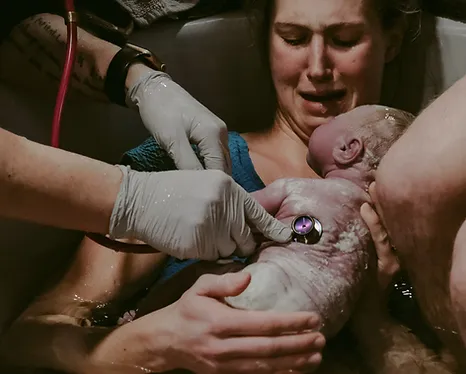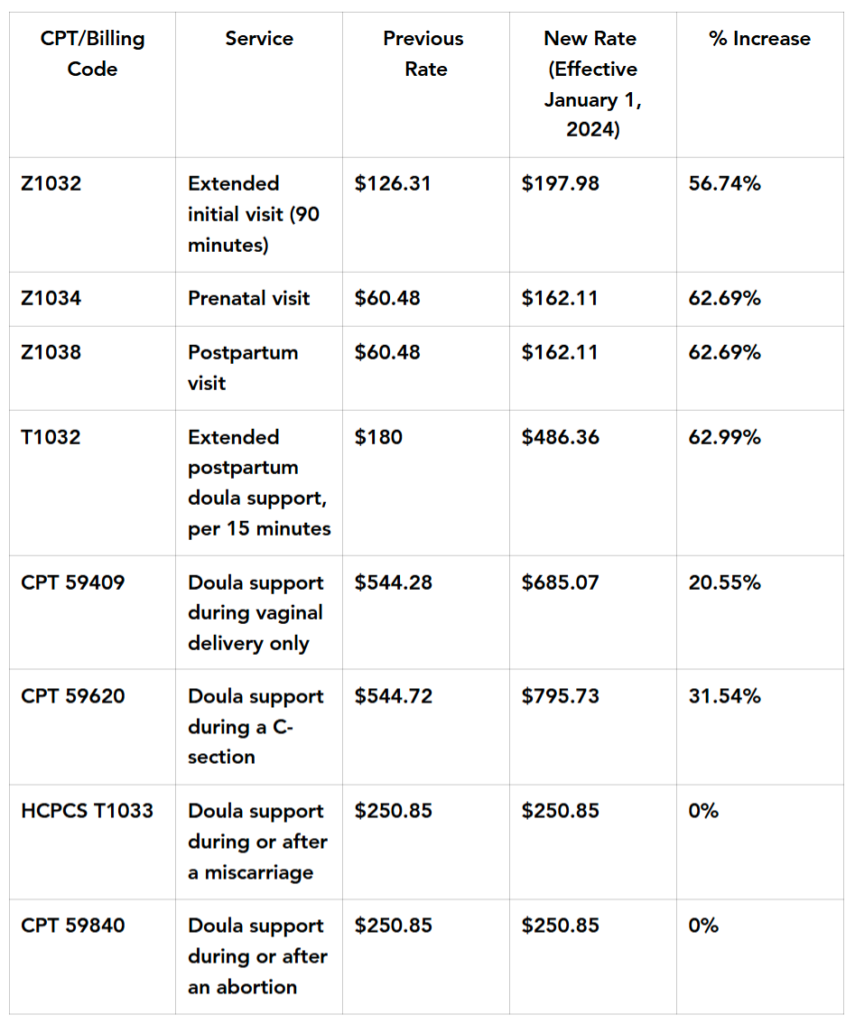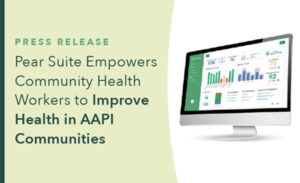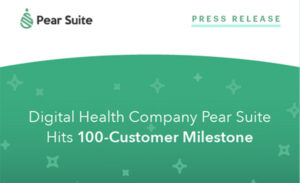Doulas and doula organizations do more than provide positive prenatal, delivery, and postpartum experiences, though they do that, too. They also reduce birth complications, C-section rates, and labor length while empowering pregnant people through the birthing process. Given that 80% of pregnancy-related deaths are preventable, doulas play a crucial role in improving the health and safety of women’s health and people who are pregnant.
Thanks to their critical role, the California Department of Health Care Services (DHCS) introduced a doula benefit into Medi-Cal via CalAIM in January 2023.
Today, doula services are a covered benefit for pregnant or recently pregnant people and their families. And covered services aren’t limited strictly to labor and delivery. Let’s explore the doula benefit for Medi-Cal members: what services are covered and what doulas and community health workers (CHWs) need to do to get reimbursed.
What is the doula benefit?
The doula benefit gives Med-Cal members enrolled in a managed care plan (MCP) and are — or were recently — pregnant to receive care from doulas, doula organizations, and birth workers. As part of this benefit, doulas and birth workers can submit reimbursement claims to MCP providers for pregnancy-related services.
These services include health education, advocacy, physical, emotional, and nonmedical support from prenatal care through labor and delivery (including stillbirth), miscarriage, and abortion. Doulas and birth workers can provide pregnancy services virtually via telehealth or in person at a hospital, in a member’s home, or at an alternative birth center.
This change means that Medi-Cal members who are pregnant or who are within one year of birth may access life-changing support from a doula without paying out of pocket. And doulas are able to receive compensation from participating MCPs for their care-outcome-improving work.
What services does the doula benefit cover?
The doula benefit covers health education and advocacy services related to pregnancy. These services include:
-
-
- – Behavioral health services
- – Nonceremonial belly binding after a C-section
- – Clinical care coordination from prenatal to delivery and postpartum care
- – Childbirth education group classes
- – Hypnotherapy
- – Lactation consulting and supplies
- – Nutrition assessments and counseling
- – Birth plans
- – Medically appropriate community health services
-
Under Medi-Cal’s doula benefit, for example, a person who has given birth in the last 12 months and may be struggling with their mental health postpartum can receive care from a doula or be referred to other community health services. Similarly, a pregnant person who hasn’t given birth yet can work with a doula to create a birth plan, identify and monitor potential birth risks or complications, and receive support and advocacy through their birth experience.
The doula services benefit is designed to help pregnant people connect with quality care from the time they become pregnant up to 12 months postpartum at no cost.
How often can a doula or birth worker perform and get reimbursed for services under Medi-Cal?
Doulas and birth workers can perform up to nine visits with Medi-Cal members from prenatal to postpartum care. More specifically, they can perform or provide:
-
-
- – One initial visit
- – Up to eight prenatal and postpartum visits
- – Support during labor and delivery (including stillbirth), miscarriage, and abortion
- – Up to two three-hour postpartum visits
-

During these visits, doulas can provide physical, mental, and health navigation services; lactation support; create birth plans; and connect members to other community-based resources. Medi-Cal members are limited to one doula visit per day. And while they can receive care from more than one doula, only one doula can bill for a visit per day.
Let’s say a pregnant Medi-Cal member meets with their doula in the morning. Later that day, they experience a complication and receive care from another on-call doula. Only one of those visits is billable that day.
How can doulas, birth workers, and CHWs become Medi-Cal providers?
Doulas, birth workers, and CHWs who perform doula services can apply to enroll in the Medi-Cal program as individuals, groups, rendering providers, or ordering/referring/prescribing (ORP) providers.
To do that, they must meet the following conditions:
-
-
- – Be at least 18 years old.
- – Have a state-issued license or ID card.
- – Have a Federal Employer Identification Number (FEIN).
- – Have a local business license, tax certificate, and permit for any city or county where they conduct services.
- – Have a business address or administrative location.
- – Provide proof of infant and adult CPR certification from the American Heart Association.
- – Complete basic HIPAA training.
- – Complete the training or experience pathway.
- – Enter into contracts with MCP providers, or licensed medical professionals, who can refer Medi-Cal members to them.
-
Once they meet the criteria, doulas and birth workers can submit their Medi-Cal applications via the Provider Application and Validation for Enrollment (PAVE) portal. Finally, approved doulas and birth workers who become Medi-Cal providers are entered into the DHCS Doula Directory and can begin performing reimbursable services.
They must also meet educational requirements through the Doula Training Pathway or Doula Experience Pathways and at least three hours of continuing education in maternal, perinatal, or infant care every three years. The DHCS can request evidence of completed training at any time.
How much can doulas and doula organizations earn through Medi-Cal?
On June 20, 2024, the DHCS released a letter officially raising the rates for doula services performed on Medi-Cal members. The new rates apply to any services rendered starting January 1, 2024. And all Medi-Cal MCP providers must pay the new rates by December 31, 2024.

How is Pear Suite simplifying doula and CHW reimbursement?
Once a doula, birth worker, or CHW completes their pathway training and officially joins Med-Cal’s doula network, they have to enter into a contract with an MCP provider to start collecting for services.
Through Medi-Cal and California Advancing and Innovating Medi-Cal (CalAIM) initiative, MCP providers are incentivized to prioritize value-based care where patients pay for outcomes not merely services. The best way to do that is by working with CHWs and CBOs. But the vetting process still takes time.
That’s where Pear Suite, a care coordination software for doulas, CHWs, and CBOs, can help. Pear Suite acts as an in-network care provider for doulas and CHWs until they can connect with a managed care provider. In-platform billing also makes it simple to connect data to requests for reimbursement.
Not only that, but the Pear Suite platform helps doulas and CHWs as a data management tool to track and document patient outcomes, monitor trends and social drivers of health, and refer patients to other social services and health resources and organizations. At the end of the day, partnering with Pear Suite means doulas and CHWs can deliver services and collect revenue faster and more efficiently.




